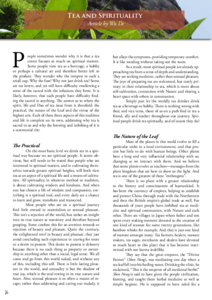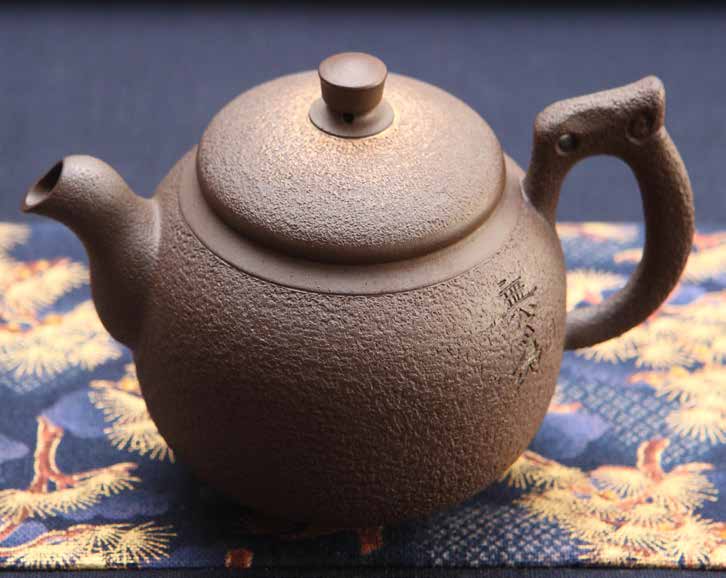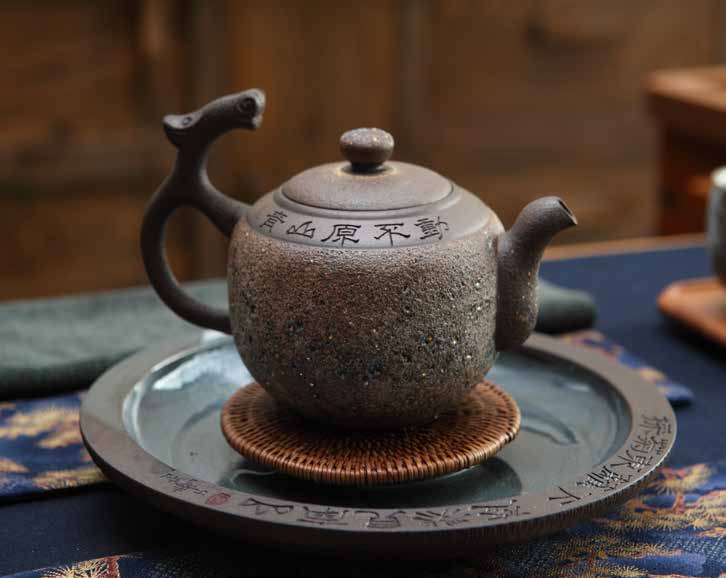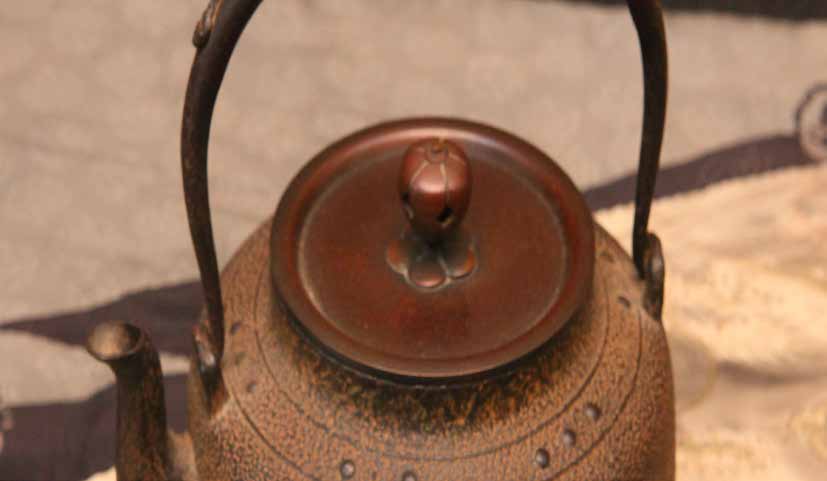
 |
|
People sometimes wonder why it is that a tea center focuses so much on spiritual matters. Some people view tea as a beverage, a hobby or perhaps a cultural art and therefore better left to the profane. They wonder why the tempest in such a small cup. Why the fuss? Why not just drink tea? Some are tea lovers, and yet still have difficulty swallowing a sense of the sacred with the infusions they brew. It is likely, however, that such people have difficulty finding the sacred in anything. The answer as to where the spirit, life and Dao of tea issue from is threefold: the practical, the nature of the Leaf and the virtue of the highest arts. Each of these three aspects of this tradition and life is complete on its own, addressing why tea is sacred to us and why the brewing and imbibing of it is a ceremonial rite:
On the most basic level we drink tea in a spiritual way because we are spiritual people. It seems obvious, but still needs to be stated that people who are interested in spiritual matters, and in cultivating themselves towards greater spiritual heights, will both view tea as an aspect of a spiritual life and a means of cultivation. All spirituality, in whatever method or tradition, is about cultivating wisdom and kindness. And when one has chosen a life of wisdom and compassion, everything is a spiritual tool, and every daily act a chance to learn and grow, transform and transcend.

Most people who are on a spiritual journey find little reward in materialism or sensual pleasure. This isn't a rejection of the world, but rather an insight into its true nature as transitory and therefore beyond grasping. Some confuse this for an aversion towards or rejection of beauty and pleasure. Quite the contrary, the enlightened revel in beauty and pleasure, they just avoid concluding such experiences in craving for more or a desire to possess. This desire to possess is delusory because there is no such thing as property or ownership in anything other than a social, legal sense. We all come and go from this world naked, and without any of this, including this self. There is little lasting pleasure in the world, and sensuality is but the shadow of true joy, which is the soul resting in its true nature and heart. Also, sensual pleasure is so often a means of escape; rather than addressing and curing our malady, it but allays the symptoms, providing temporary comfort. It is like weeding without taking out the roots.
As a result, most spiritual people are already approaching tea from a sense of depth and understanding. They are seeking medicine, rather than sensual pleasure. The joys of preparing tea are welcomed, but rarely primary in their relationship to tea, which is more about self-cultivation, connection with Nature and sharing a heart space with others in communion.
Simply put: let the worldly tea drinker drink tea as a beverage or hobby. There is nothing wrong with that; and vice versa, those of us on a path find in tea a friend, ally and teacher throughout our journey. Spiritual people drink tea spiritually, and of course they do!
Most of the plants in this world evolve to fill a particular niche in a local environment, and that process has little to do with human beings. Other plants have a long and very influential relationship with us, changing as we interact with them. And we believe that some plants evolve as teachers - messages from the plant kingdom that are here to show us the light. And tea is one of the greatest of these "entheogens".
There is no plant with a greater relationship to the history and consciousness of humankind. It has been the currency of empires, helping to establish and protect China through trade with the Northerners and then the British empire's global trade as well. For thousands of years people have imbibed tea as medicine and spiritual communion, with Nature and each other. There are villages in Japan where father and son spent every waking moment devoted to the creation of one kind of teaware for some twenty generations, like bamboo whisks for example. And that is just one kind of teaware amongst many. Tea farmers, healers, teaware makers, tea sages, merchants and dealers have devoted so much heart to this plant that it has become intertwined with our karma indelibly.
They say that the great emperor, the "Divine Farmer" (Shen Nong), was meditating one day when a tea leaf fell into his boiling water. Drinking the elixir, he exclaimed, "This is the emperor of all medicinal herbs!" Shen Nong is said to have given the people civilization, farming, and taught them herbal medicine as well as simple hygiene. He is supposed to have ruled for a thousands years, though what he most likely represents is all the wisdom of the tribal shamans and chieftains of pre-civilized China, who were the source of plant/ animal domestication and other social advancement. The tea leaf falling into the legendary emperor's pot is demonstrating its desire to be human, to connect to the consciousness of people. It is the king of all herbs because other plant medicines are only useful to treat one or a few illnesses, and are often poisonous if one doesn't have those symptoms, whereas tea can be imbibed every day and provides alignment and harmony with Nature. This means that tea's medicinal qualities are in the way it aligns body, mind and spirit with Nature. And when we are aligned with our environment, we also automatically align with each other - peacefully and in an open heart space.
Plants are aware, and recognize their connection to the other kingdoms far more intimately and with greater interconnectedness than we do: opening and receiving the mineral kingdom, the light and power of the sun, moon and stars and then giving on the other end, allowing animals and humans to consume their energy, often propagating themselves through that process. The energy of the universe flows and moves through them in ways that we can only understand through consuming and communing with them. They are the source of our solar energy, for example, which animates all that we do: me in the writing and you in the reading. It only makes sense that certain plants would evolve in conjunction with animals, and it happens all the time. Animals then evolve in response to plants as well. In light of that, you could say that we have the receptors to receive tea - a connection with this plant body, mind and soul. That may have come from years of drinking it, which might explain why some people have more receptors than others. But any of you who know Wu De, know that he is a hopeless romantic, so I like to believe that we had those receptors before we ever drank any tea and were just waiting to meet, like estranged lovers waiting for that first, fated star-crossing.

Tea and humankind have become intertwined completely, which means we share the same fate, in good and ill. This plant has embraced us as only Nature Tea and Spirituality can. And so much in the tea world has been corrupted and turned to industry and pollution, like all aspects of what humankind has done to the Earth, our Mother. As a result, even today, tea spans the entire human spectrum: from the lowest of greed and environmental destruction to the highest of spiritual states, and everything in between.
Tea is medicine, but not in the Western sense of the word, more in a Native American sense: anything that puts us in alignment with the Great Spirit and all life on this planet. Health of body, mind and spirit both create such harmony and result from it. This means that tea is spirituality. The profane, economic trade of tea has only been around for one to two thousand years, and only predominantly for five hundred. Prior to that, all tea was drunk medicinally, which is to say spiritually. There are three-thousand-five-hundred-year-old cave paintings in Yunnan. Some of them portray tea picking and processing, but the vast majority are of tribes bringing offerings of fruits, flowers and incense to pray before the sacred tea trees. For thousands and thousands of years tea was viewed as a sacred medicinal plant. As a result, its relationship with all the spiritual traditions of the Far East was assured, since the shamans would pass on such medicine to those that followed: both Buddhist and Daoist traditions have deep and meaningful relationships with the Leaf, to the point that when the Japanese came to China to learn Zen Buddhism, they returned with tea plants, tea and teaware and told their countrymen that the masters in China had said that in order to promulgate Zen in Japan it would be necessary for tea to take root their as well, for "Zen and Tea are one flavor!." They said this because they recognized the spiritual value of tea. Daoist mendicants and Zen Buddhists both had their own origin legends for tea, highlighting various qualities they value in tea. Zen monks and nuns were likely the first people to domesticate tea.
Tea is a very sensitive plant, and the fact that it's brewed with water makes it doubly sensitive. Water also has been proven time and again to be greatly influenced by words, thoughts, music and energy, like the water crystal studies of Dr. Eomoto for example. He photographs water crystals and then exposes the water to positive and negative influences before re-photographing the crystals. He has found that the positively influenced crystals - exposed to positive, complimentary words or power words like 'love', as well as good music - are always symmetrical and beautiful, whereas the negatively influenced ones - exposed to hatred, anger, etc. - are all asymmetrical, distorted and ugly. Since tea and water are both so sensitive to the mind of the one brewing, even beginners quickly realize the influence their mind is having on the tea: a nervous mind makes nervous tea and a quiet mind also quiets others. Understanding this experientially, one can quickly realize why tea has sat in ceremony between master and student for so many thousands of years. After all, what could be more poignant, metaphorically and literally, than to have the student drink in the mind of the master? And this ceremonial exchange goes the other way too: there is a long-standing Chinese tradition of preparing tea for masters, elders or even the husband in a Chinese wedding ceremony, and the acceptance of the tea is an acceptance of the student or wife, for they have put themselves into their tea. This ability to transmit is one of the most important and wonderful qualities of tea preparation, and one that has endeared it to spiritual aspirants for so long.
The fact is that tea is a Dao - always has been, always will be. The lineage of tea sages, using tea to cultivate themselves and then share what they have cultivated with others dates back before the pyramids. This incredibly vast heritage of devotion, prayer, study and meditation surrounding tea answers why it is a spiritual practice better than any article could. The why isn't as important as the fact that it works, and has for millennia!
It is not sufficient merely to be a great master in painting and very wise, but I think it is necessary for the painter to be very moral in his mode of life, or even, if such were possible, a saint, so that the Holy Spirit may inspire his intellect.
In James Joyce's portrait of himself as a young artist he mentions that the true, high arts cause a person to experience great stillness, meditation and contemplation while lower arts catalyze movement in us. When people enter the church and look up at Michelangelo's work they are awestruck, silent and agape. When we look at an advertisement or more entertaining movies that depict sex and/or violence our animal nature is stimulated, and our desires start churning. Though it is true that art has expanded to limitless realms of understanding and imagination, as our creativity has been socially and psychologically liberated, the true purpose of art has always and ever will be to channel the sacred into form and then share that form with others in the hope that it help encourage their own return to the transcendent.
There is a whole genre of art meant to expose, hash out or even defile boundaries: art that attacks closed-mindedness or perhaps uncovers aspects of culture that need addressing. Such art is a testament of the times and can indeed be usefully cathartic, or even lead to positive changes. And there is no artist that would wish for a return to the days when art was constricted, forced to create religious images or beholden to certain fashionable criteria. However, the true purpose of art has always been to convey the sacred - dating back tens of thousands of years!
If you believe that metaphysical truth and spiritual upliftment are aspects of great art then it only stands to reason that the artist who wishes to create such art must spend as much or more time attuning their spiritual sensitivity as she does honing her skills with brush and paint, clay or stone. If you want to create art that evokes the sacred then you must have a connection to sacred inner space, and the greater that connection is, the more powerful your art will be and the more moved those who approach it will be.
And what about the effects the artistic process has on the artist herself? There is a tradition in Zen of using the arts themselves as a means of cultivation; for if the artist is meditating and achieving mystical states before and during the creative process, then she also will be as transformed as those who perceive her art - or more likely much more for standing within the light itself.

You reach the point in the mastery of any art where it is necessary to begin working on the self in order to achieve greater results, because the true artist realizes that the way she treats people, what she eats, how she sleeps and walks all affect her art tremendously. Emerson said that while the lesser artists create to enhance self and are therefore prone to seek inspiration in wine or drugs, the true artists efface themselves in pure spirit and become its instrument; and moved by the Holy Spirit, they then create the masterpieces that still the soul even thousands of years later.
In other words, if you want your tea to be a transformative experience for you and those who join you then you must cultivate yourself spiritually. If your mind is wandering, and you haven't mastery over your thoughts, you will not create a sense of the sacred in the tea you serve others. The more peaceful you are, the more peaceful will be the tea you pour, which will bring Tea and Spirituality you more peace and allow you to share it, and so on in a deepening spiral...
There is a story of a Daoist who was quite old and his career had kept him from progressing very far spiritually, but now that he was retired he had an earnest desire to grow. He came across a painting in the market, which was an antique but still cheap because the ink and colors were faded; it hadn't been well cared for. For the first time, the old man saw a glimpse of the Dao. He knew that whoever painted it was surely illuminated. He bought it and took it home. He then enshrined it and spent hours every day meditating in front of it. The bridge, stream and mountain trail led past a grove of trees to a distant temple. One day, after some months of such meditations, he found his feet upon that bridge. He could feel the wood and hear the water flowing beneath him. He looked back and saw himself meditating in the distance. He smiled, turned and rounded the corner and was never heard from again.

When you brew tea with mastery this doesn't mean you have learned all there is to know about tea; all the information about tea history or lore won't make a tea that transforms people or yourself. Quite the opposite. Such know-it-alls are usually egotistical and spend their tea sessions discussing and debating, writing opinions in notebooks - opinions about the tea or something else altogether. And mastering how to hold a teapot, how to pour, the proper temperature, etc. also won't make tea that heals you or others. To do that, you will have to liberate yourself.
True mastery isn't about control. It is about finding that place in you that connects to the Dao and allowing it to act through you, so that it is preparing the tea. When Stillness itself prepares tea, of course those who drink it will be inclined to become still!
It is the noise of the world and our conditioning in it that has separated us from our goodness. If we do not do wrong, we do the right thing. Without evil in our heart, goodness shines through; and if we're not selfish, selflessness is abundant. All of the saints of all the traditions have verified the inherent goodness of man, and that the return to our inner child, our true nature, is a softening and returning to the Dao. Following tea is finding the Dao in our heart and allowing it to run things, for it is connected to the universal intelligence that has organized the cosmos in perfect alignment and dance.
If tea is to be an art that uplifts those who practice it, and those who participate in it - the guests/observers - it is therefore important for the artist to be all that she hopes to convey. This is a life of tea. And in such a life, the Chajin realizes that in all that she does, from her awakening mind to the last before sleep, in every step, in every breathe, in the way she eats and treats people, in her meditation and all that is between meditation sessions - she is brewing tea!
